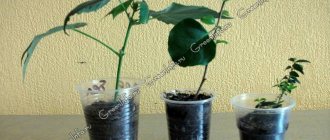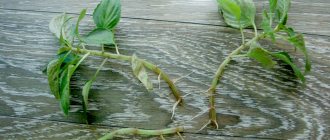Many people dream of propagating their favorite rose bush. June-July is the best time to do this easily and simply using cuttings.
Candidate of Biological Sciences Lyudmila Uleyskaya , who worked at the Nikitsky Botanical Garden (Crimea) for more than 30 years, will tell you about all the nuances of rose cuttings. Currently, Lyudmila is a consultant for the Gardener and Gardener magazine and a number of online publications.
According to the expert, rooting of cuttings should be carried out within a certain time frame:
- for greenhouse roses from a bouquet - from March to April;
- for open ground roses - from the second half of June to the end of July.
The optimal temperature for rooting is 22-25°C (sharp fluctuations should not be allowed).
Humidity – 90-100%.
Lighting – diffused sunlight.
Not all types of garden roses take cuttings well. Climbing, miniature, ground cover and many varieties of polyanthus roses and floribunda almost always take root. Hybrid teas are worse (especially varieties with dark red and yellow colors) and develop weaker than grafted ones.
So, let's look at all the stages of rose cuttings.
Transfer
In a normally developing plant, roots appear in 3-4 weeks. Check by pulling slightly upward. If you think that it is too late to replant or any other reasons arise, then you can leave the cutting for another year, after making sure that it will be in a dry place without drafts all this time. And you can plant it already in mid-summer.
For replanting, you must choose fertile soil. And before you plant a plant in it, you need to fertilize the soil.
After that, follow the algorithm.
The hole for the plant must be free so that the roots fit freely and do not break when planting. The ideal depth would be 5 cm.
Next, you need to do the already familiar steps: plant the cutting, fill the hole with earth and press the earth around.
Be careful and careful not to break the roots.
Then pour water, you should also be careful in this process.
If the roots have developed well and no new shoots have formed, you may not cover the cutting with anything, but you should constantly water the plant in this case so that the soil does not become dry. If you cannot monitor the soil, then it is better, of course, to cover it with plastic bottles or the same cloth.
You need to wait for flowering after 2-3 years. Since the plant needs to develop the root system sufficiently to begin abundant flowering.
Care after rooting
As soon as a small new leaf appears on the rooted cutting, it means that the process of root formation has begun. This can happen in 6-8 weeks. After this, it is recommended to gradually ventilate the greenhouse, increasing the ventilation time every day. It is necessary to ensure that the soil is always moist.
In the spring, when more and more new leaves appear on the plant and the ground warms up, the rooted cuttings of roses are planted in the ground in a permanent place. This should be done no earlier than the end of April, preferably in May, when there are no night frosts. Subsequently, for several years, the roots will have to be insulated for the winter.
Optimal conditions for root emergence
The roots of rose seedlings appear after about a month. With any cutting method, it is important to maintain a temperature of about 20 degrees and high atmospheric humidity until this moment. Future roses should not be kept in bright sunlight to avoid burns. If they are in a greenhouse or greenhouse, ventilation is required in the morning and evening.
Use of growth stimulants
Soaking with a special biostimulator accelerates the appearance of roots. If it is purchased, you need to keep the stems for six hours.
Purchased products to stimulate root growth:
| Biostimulating drug | Correct proportions of solution (product/water) |
| "Kornevin" | 1 gram per liter |
| "Radifarm" | 2 drops per liter |
| "Heteroauxin" | 1 tablet per 2.5 liters |
| "Epin extra" | 1 ampoule per 2 liters |
| "Zircon" | 1 milliliter per 10 liters |
When using Radifarm, the soaking time is reduced to half an hour - the drug is very active. You can use traditional methods - an aqueous solution of aloe juice (9:1) or water with honey (dissolve a small spoon in 500 ml of water). Then the soaking process is extended up to 24 hours.
Step-by-step instructions for planting cuttings in a pot
To plant cuttings you should:
- Carefully treat the container and tools with a weak solution of potassium permanganate. This is necessary in order to get rid of possible fungal and bacterial infections that can kill the plant.
- Add a layer of drainage 3–5 cm thick. You can use gravel, crushed stone or broken brick for it. To disinfect the drainage, pour boiling water over it or also use potassium permanganate.
- Place soil suitable for roses on top of the drainage, compact it a little, but do not compact it. Ordinary soil from the street will not work - it is better to buy it in a store.
- Make a small depression, plant the cutting and cover with soil. If there is more than one seedling, the distance between them should be at least 5–6 cm.
- Water the plant with cool water - it should be settled or rainwater.
- Water the seedlings as needed. Do not overdo it with water so that the roots are not washed away. It is better to use a spray bottle.
Other germination methods
You can achieve the appearance of roots in other ways. Some gardeners believe they are even more efficient than using water.
In pots
For each future rose you will need a 500 ml pot and soil mixture. If it is purchased, it is better to choose one that is suitable for roses and violets. You can prepare the soil yourself - mix garden soil and sand in a 2:1 ratio and disinfect the resulting soil. When planting several cuttings in a large container, the step between them should be at least 6 cm.
The fact that roots have appeared will be indicated by soft green shoots on the stems
How to plant cuttings correctly:
- Wipe the inside of the pot with potassium permanganate to disinfect, place small pebbles on the bottom for drainage, then add soil.
- Dig a small hole, place the stem, fill and compact the soil, and water with settled water.
- Cover the potted seedling with a jar or plastic bottle, creating a mini-greenhouse.
When the surface of the soil begins to dry out, spray it with water from a spray bottle. The fact that roots have appeared will be indicated by soft green shoots on the stems. Then the roses begin to harden - adapt to the environment, periodically removing the coating for 5 minutes. This period gradually increases, and when leaves appear, flowers can be planted in open ground. If possible, they should also be accustomed to the street gradually, periodically placing pots on the balcony.
In the package
It is possible to create greenhouse conditions using an ordinary plastic bag without any pots. For this:
- Fill the bag one third full with a suitable soil mixture.
- Treat the bottom cut with a root growth enhancer and place in soil.
- Tie the bag so that the top is filled with air, and hang it near the window.
It is possible to create greenhouse conditions using a regular plastic bag without any pots
Green shoots will indicate the formation of roots. They will appear in two to three weeks. And replanting into the ground can be done after a month.
In the newspaper
This method is called the “burrito method”: the stems wrapped in newspaper look like a Mexican dish. How to cut roses this way:
- Spread the newspaper and place several prepared stems on it. Fold the edges at the cuts and wrap the rest of the paper around the cuttings so that there are no holes in it.
- Wet the resulting roll thoroughly.
- Place the bundle in a plastic bag, tie it and store at a temperature of about 20 degrees.
This method is called the "burrito method"
Unroll the roll once a week to check. If rot appears, the newspaper needs to be changed, leaving only healthy copies. After this, the bundle must be moistened abundantly again. The appearance of roots can be expected after two to three weeks.
Using potatoes
Using tubers to root cuttings is an effective and low-cost method. Future roses will receive the necessary nutrients and moisture for root formation from the tuber.
Using tubers to root cuttings is an effective and low-cost method
To create seedlings, you will need medium-sized potatoes, without signs of rot, wilting or damage. There should be no sprouts or green areas of the peel on them. The tubers must be thoroughly washed and treated with potassium permanganate for disinfection.
How to germinate a pink cutting in a potato:
- Cut a hole in the tuber that matches the diameter of the stem. The bottom of the recess should be about a centimeter thick.
- Treat the cut of the cutting with a biostimulant and place the stem in the hole.
- Fill a 500 ml container with soil one third of the way, put the potatoes in there and sprinkle with soil. Water it.
- Cover with a jar or plastic bottle to create a greenhouse effect.
Next you need to proceed as when growing seedlings in pots. But experienced gardeners say that rooting occurs faster - after two weeks.
Video: roses in potatoes
Roses cannot be rooted - what is the reason?
The main reason is in the varieties, some of them are distinguished by very thick (fatty) shoots of a reddish color and huge buds. They are the ones who almost always begin to rot; naturally, rooting does not occur.
In addition, experienced gardeners claim that hybrid tea and park roses are least suitable for propagation by cuttings. Root formation occurs much more actively in floribunda, climbing and groundcover plant varieties.
Greenhouse flowers that are grown for cutting are often fed with growth stimulants and fertilizers; they are too delicate and not adapted to survive in harsher conditions.
What is cutting?
A rose cutting is a specially cut part of a plant used for vegetative propagation. Cuttings – vegetative propagation of a plant using cuttings.
Important! Cuttings are the most effective method of propagating roses, since only in this case the purity of the variety is preserved; it is in this way that healthy and strong young bushes can be grown.
Propagating roses by cuttings in the fall at home is a proven way to obtain high-quality planting material.
When can it be produced at home?
Cuttings are best done in late autumn, late October or early November. At this time, roses fade and gradually shed their petals. Pruning is carried out after the first night frosts and before the onset of stable frosts. During this period, they begin to prune rose bushes for the winter. These trimmed stems are suitable material for cuttings.
Roses from cuttings from a bouquet: preparation for planting
Roses selected for propagation should be properly prepared for planting:
- Remove buds and flowers.
- Cut cuttings from the middle part of the stem (length from 15 cm, but not more than 30 cm).
- Remove the lower leaves completely, shorten the upper ones by half.
- Remove thorns.
Important! The cuttings are left with 2-3 buds, the lower part is cut at 45 degrees under the lower bud (indent - 1 cm). The upper cut is straight, directly above the kidney.
It is useful to soak the lower sections in a solution of biostimulants, for which they use epin, honey, aloe or potato juice, after which the cuttings are planted in water, soil or grown in another way.
Distinctive features of crop propagation in autumn
You can cut roses in both spring and autumn.
But gardeners prefer to do this in the autumn. This is due to the fact that from a flowering bush you can see what kind of rose you want to propagate and it is difficult to confuse it with a non-flowering bush. And the main reason for autumn propagation is that it is combined with autumn pruning. Over the winter, the cuttings should take root and get stronger, and in the spring they will produce young shoots.











